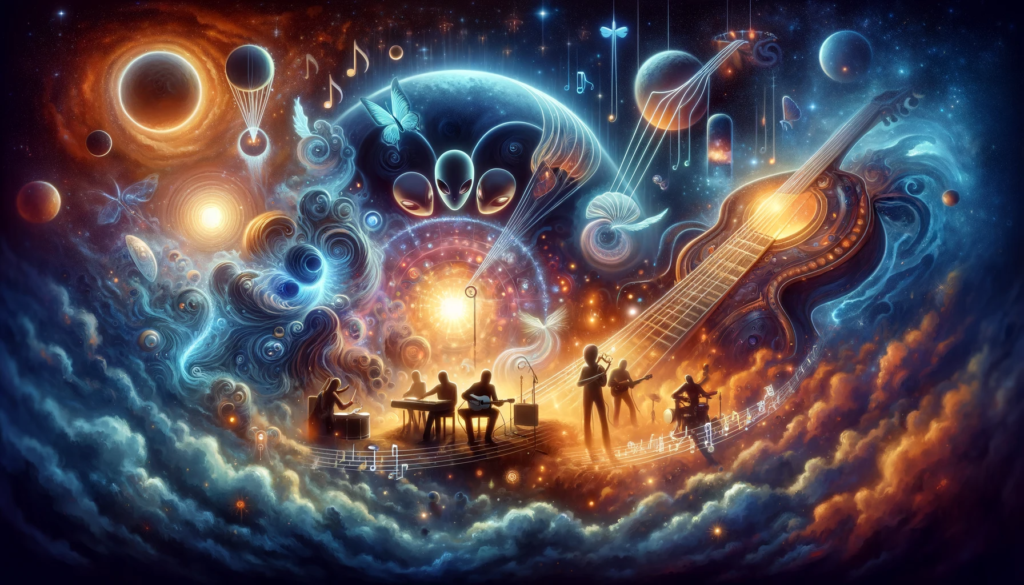Alien Message in the Music

Could it be possible that our musical artists receive messages of extraterrestrial origin as they craft their songs? Within the vast landscape of musical creativity, inspiration remains both a bountiful and elusive entity, as varied and unique as the artists themselves.
Musicians may find their muse in the whispering secrets of nature, the profound depths of personal experiences, the weighty discourse of societal issues, or the mystifying realm of dreams. Interestingly, a significant number of artists attribute their inspiration to spiritual or divine sources, suggesting a transcendent connection between their music and a higher power.
This article looks into the fascinating intersection of music and spirituality, exploring how dreams and the divine have played pivotal roles in the creation of some of the world’s most beloved songs. From the enigmatic lyrics of Led Zeppelin’s “Kashmir” to the dream-inspired melodies of Paul McCartney’s “Yesterday,” we will journey through various narratives that reveal the profound and often mystical sources of musical inspiration.
“Kashmir,” a track on Led Zeppelin’s 1975 album “Physical Graffiti,” is a classic rock song recognized for its distinctive blend of Eastern and Western musical influences. The song’s lyrics, penned by Robert Plant, depict a spiritual journey and have elicited diverse interpretations over time. The lyrics of “Kashmir” are filled with rich imagery that paints a vivid picture for the listener. Lines like “I am a traveler of both time and space, to be where I have been” and “As the dust that floats high in June, when moving through Kashmir” evoke a sense of journey and exploration. This ambiguity and open-endedness allow listeners to ascribe their own meanings and emotions to the song, thereby personalizing their connection to it.
Neil Young’s “After the Gold Rush,” the eponymous track of his 1970 album, is a folk rock composition featuring enigmatic lyrics that have sparked considerable conjecture. Some theorize that the song’s narrative speaks to environmental decay or a post-apocalyptic world.
John Lennon, the famed Beatle, reported a UFO sighting in New York City on August 23, 1974. He recounted this encounter in several interviews, asserting that he observed the UFO from his apartment balcony. Although other witnesses also reported the sighting, it has never been conclusively explained or validated as an extraterrestrial encounter. While Lennon’s song “Nobody Told Me” alludes to this personal experience, the song broadly addresses unexpected and peculiar happenings in life.
Paul McCartney, another Beatle and a successful solo artist, has revealed in interviews that dreams have been a source of inspiration for some of his songs. The most notable instance is the creation of “Yesterday.” McCartney claims the melody surfaced in a dream, and upon waking, he promptly played it on the piano to memorize it. Initially, he wondered if the melody was a subconscious recollection of an existing tune, but eventually recognized it as an original composition. Though not all of McCartney’s songs were dream-inspired, this example underscores the impact the subconscious can have on the creative process for some artists.
Several notable artists have claimed that their music was derived from or inspired by their dreams. Here are a few examples:
- Keith Richards of The Rolling Stones has stated that the primary riff for the legendary song “(I Can’t Get No) Satisfaction” was dream-inspired.
- Billy Joel’s “The River of Dreams” was reportedly born from a dream, with lyrics reflecting the search for life’s meaning.
- Sting of The Police revealed that the lyrics for “Every Breath You Take” came to him in a dream.
- Trent Reznor of Nine Inch Nails has said that the song “Hurt” was inspired by a dream about dying.
While these artists credit dreams as a source of inspiration, it’s crucial to understand that this is just one method among many for musicians and songwriters. Dreams can catalyze creativity, but artists draw from a broad spectrum of experiences, emotions, and ideas to craft their music.
Numerous celebrated artists have, at various stages of their careers, suggested or stated that their music or inspiration is derived from a higher power or divine source:
- Prince often spoke about his connection to a higher power and its influence on his music.
- Stevie Wonder has credited God for his musical talent and inspiration.
- Bob Dylan, during his “born-again” Christian phase in the late 1970s and early 1980s, explicitly linked his songwriting to divine inspiration.
- Kanye West’s album “Jesus is King” reflects his exploration of themes of faith and spirituality.
- Lauryn Hill has openly discussed her spiritual connection to her music and her belief in divine guidance.
- Carlos Santana frequently mentions his belief that his music stems from a higher source.
- George Harrison, the late Beatles guitarist, was deeply influenced by Eastern spirituality.
- Brian Wilson of The Beach Boys has referred to feeling a connection to a higher power when creating music.
- Leonard Cohen often explored religious themes in his music.
- Sufjan Stevens has talked about the role of spirituality and faith in his songwriting.
- Johnny Cash frequently discussed his strong faith and its influence on his songwriting.
- Aretha Franklin, the late Queen of Soul, was deeply influenced by her gospel roots, and her faith played a significant role in her music.
- Bono of U2 often discusses the importance of spirituality in his life, and religious themes are frequently present in the band’s music.
- Alice Cooper, known for his shock-rock persona, has openly discussed his Christian faith and how it has influenced his music.
- Al Green, the soul singer and reverend, frequently discusses the connection between his faith and his music.
- Cat Stevens, now known as Yusuf Islam, converted to Islam in the late 1970s, which significantly influenced his music and spiritual beliefs.
- Patti Smith, the punk poet, has discussed the spiritual aspects of her creative process and has mentioned feeling a connection to a higher power when writing music.
- Matisyahu, the Jewish reggae artist, has discussed the role of spirituality in his music, particularly the influence of Hasidic Judaism on his songs.
- Whitney Houston, the late pop and gospel singer, frequently talked about the role of her faith in her life and music career.
- Michael W. Smith, the contemporary Christian musician, has been open about his faith and how it influences his music.
- John Coltrane, the late jazz saxophonist, experienced a spiritual awakening in the 1950s, which greatly impacted his music, as evidenced by his iconic album “A Love Supreme.”
- India.Arie, the R&B and soul artist, frequently discusses her spiritual journey and its influence on her music.
These artists represent just a portion of those in the music industry who credit a higher power or divine source for their creative inspiration. Spirituality, faith, and personal beliefs often profoundly influence musicians, shaping their songwriting process and the thematic content of their work.
Within the broad context of our existence and as we explore new viewpoints and meanings in our relationship with the universe and its potential life forms, the idea of “The Curation of our Reality” becomes increasingly significant. Music and movies, as communicative and expressive mediums, hold a crucial role in this curation. Considering the possible influence of advanced civilizations on our cultural and creative expressions, our art forms acquire a new layer of interest and potential importance. Both film and music have been key in challenging standards, molding societal narratives, and initiating discussions about our understanding of existence. The incorporation of subtle, potentially non-human intelligence (NHI), messages in these art forms enhances our comprehension of their potential. As a musical piece ends and movie credits roll, our examination of reality persists. Perhaps, embedded within the beats of a song or the narrative of a film, we might discover the clues necessary to understand our position within this curated reality.



